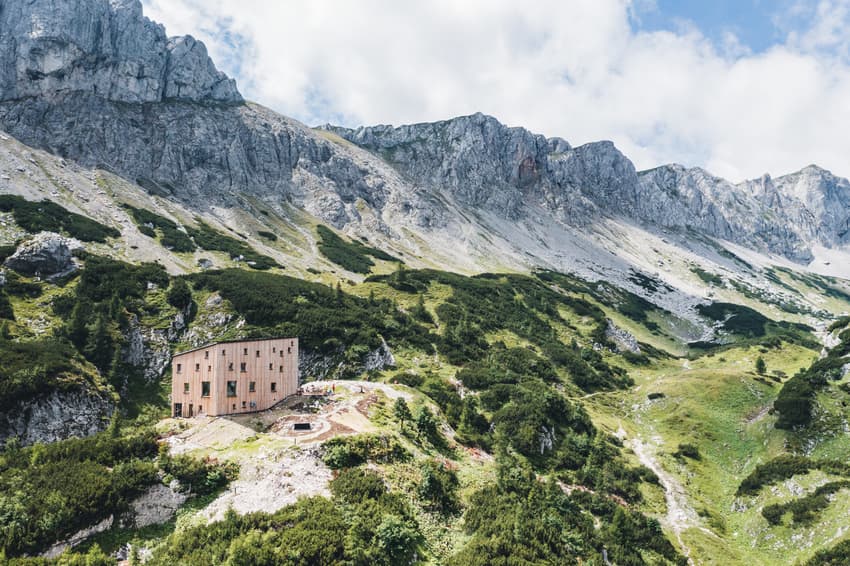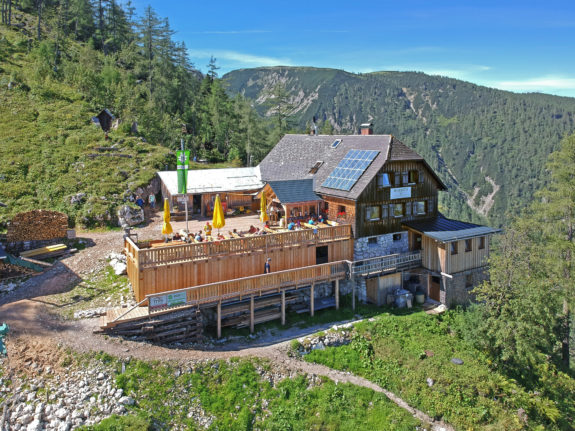How Austria's Alpine huts are saving energy this winter

With energy prices rising and the crisis far from over, Austrian mountain huts are looking for ways to save energy. Here are some of the measures taken - some of which could easily be adapted to households.
Since the Russian invasion of Ukraine, energy prices have been rising in Europe and Austrians have felt the consequences of increasing inflation, even as the federal and state governments announced measures to cushion the population.
With that, people are looking to save up at the end of the month. The Climate Ministry issued a series of tips and recommendations, including driving slowly and showering quickly. Austrians have devised clever solutions, even resorting to old "technologies" like old cellars.
READ ALSO: EXPLAINED: How to keep energy bills down in Austria
The Austrian Alpine Association, which operates its 231 huts in the Alpine country, recently highlighted measures taken by the Hütten - some of which could easily be adapted to households.
“From an ecological point of view, our huts are exemplary. First out of conviction, and secondly because of the shortage and the difficult conditions on the mountain, " said Andreas Ermacora, President of the Austrian Alpine Club.
"We hope that this will also be an inspiration for the 'normal' gastronomy and accommodation establishments down in the valley", he added.
'Optimise your routes'
Because of the long distances, every Alpine Club hut has to optimise transport routes for food supply, the institution said. In everyday life, this could mean doing the shopping on the way home from work instead of driving your car, especially for this.
The people working in the huts also "use less hot water in huts and get by longer with the same laundry by dressing according to the 'onion-principle'". The idea is that "outer clothes", which are not in contact with the skin, could be washed less often than undergarments, for example.
READ ALSO: ‘Mission 11’: Austrian government reveals tips on how to save energy and fuel
Alpine huts are also supplied with renewable energy, usually from a "small hydroelectric power plant", according to the alpine association. They also use solar-thermal production for hot water instead and use wood or pellet for heating, according to the alpine Club Vice President Doris Hallama.

The Zellerhütte of the Alpine Club branch TK Windischgarsten in Austria (Fotocredit:Zellerhütte/Alpenverein)
Even before the energy crisis, the isolation and concept of the huts promote energy-saving measures, according to the Alpine Club. The group awards huts that follow strict ecological requirements with an "eco-label" which guarantees "environmentally sound management, regulated water consumption and economical use of energy".
This year, two huts received the label: the Zellerhütte im Toten Gebirge and the Voisthalerhütte.
The first, located in Upper Austria near the border with Styria, is a small hut built in 1901 with 26 sleeping places. The second, in Styria, has existed since 1898, but a new building up to the structural and legal requirements was built in 2018. The solid wood building now meets the latest energy and structural engineering standards.
Comments
See Also
Since the Russian invasion of Ukraine, energy prices have been rising in Europe and Austrians have felt the consequences of increasing inflation, even as the federal and state governments announced measures to cushion the population.
With that, people are looking to save up at the end of the month. The Climate Ministry issued a series of tips and recommendations, including driving slowly and showering quickly. Austrians have devised clever solutions, even resorting to old "technologies" like old cellars.
READ ALSO: EXPLAINED: How to keep energy bills down in Austria
The Austrian Alpine Association, which operates its 231 huts in the Alpine country, recently highlighted measures taken by the Hütten - some of which could easily be adapted to households.
“From an ecological point of view, our huts are exemplary. First out of conviction, and secondly because of the shortage and the difficult conditions on the mountain, " said Andreas Ermacora, President of the Austrian Alpine Club.
"We hope that this will also be an inspiration for the 'normal' gastronomy and accommodation establishments down in the valley", he added.
'Optimise your routes'
Because of the long distances, every Alpine Club hut has to optimise transport routes for food supply, the institution said. In everyday life, this could mean doing the shopping on the way home from work instead of driving your car, especially for this.
The people working in the huts also "use less hot water in huts and get by longer with the same laundry by dressing according to the 'onion-principle'". The idea is that "outer clothes", which are not in contact with the skin, could be washed less often than undergarments, for example.
READ ALSO: ‘Mission 11’: Austrian government reveals tips on how to save energy and fuel
Alpine huts are also supplied with renewable energy, usually from a "small hydroelectric power plant", according to the alpine association. They also use solar-thermal production for hot water instead and use wood or pellet for heating, according to the alpine Club Vice President Doris Hallama.

Even before the energy crisis, the isolation and concept of the huts promote energy-saving measures, according to the Alpine Club. The group awards huts that follow strict ecological requirements with an "eco-label" which guarantees "environmentally sound management, regulated water consumption and economical use of energy".
This year, two huts received the label: the Zellerhütte im Toten Gebirge and the Voisthalerhütte.
The first, located in Upper Austria near the border with Styria, is a small hut built in 1901 with 26 sleeping places. The second, in Styria, has existed since 1898, but a new building up to the structural and legal requirements was built in 2018. The solid wood building now meets the latest energy and structural engineering standards.
Join the conversation in our comments section below. Share your own views and experience and if you have a question or suggestion for our journalists then email us at [email protected].
Please keep comments civil, constructive and on topic – and make sure to read our terms of use before getting involved.
Please log in here to leave a comment.